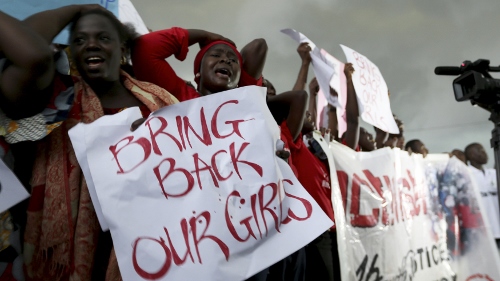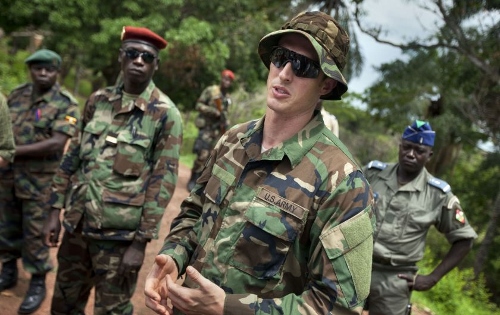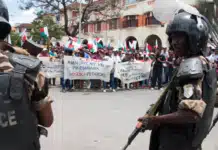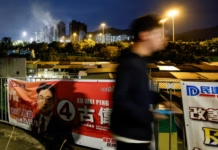Can a solution to the Boko Haram insurgency be found under capitalism?
Hassan Taiwo Soweto, Democratic Socialist Movement (CWI Nigeria), Lagos
The abduction on 14 April by Boko Haram of over 200 girls from a public secondary school in Chibok – a small town in Borno State – has sparked global outrage. Together with a big campaign that has taken off on social media sites (twitter and facebook) under the hashtag #BringBackOurGirls, protests and demonstrations have been held in several cities within and outside Nigeria.
While the most audible demand, so far, is for the return of the abducted girls, there is no doubt that many people want an immediate end to the Boko Haram insurgency whose deadly attacks have continued non-stop since 14 April. The parents and families cannot even take solace in the assurance that the government is effective enough to obtain their rescue.
The origins of Boko Haram
This crisis has again highlighted the failure, weakness and ineffectiveness of President GoodluckJonathan’s government. However the working masses and youth must not for a moment make the mistake that all it takes to tackle the Boko Haram insurgency is a strong President. In reality, President Jonathan’s failure reflects the failure of Nigeria’s neo-colonial capitalism. Boko Haram is itself a product of the capitalist-engendered conditions of mass misery, hopelessness, joblessness and poverty in the midst of abundance.
Perhaps the first time most Nigerians became aware of Boko Haram was in 2009 after its leader, Yusuf Mohammed, was captured. After parading him on television, the police summarily executed him without trial. Before then, the group existed as a fundamentalist religious sect, largely tolerated by the rest of the Muslim community and the people. The group’s official name is ‘Jama’atu Ahlis Sunna Lidda’awati wal-Jihad’, which in Arabic means ‘People Committed to the Propagation of the Prophet’s Teachings and Jihad’. But just like the history of most fundamentalist religious groups, Boko Haram offered much more than religious vitriol. The group also condemned social and economic injustice and the corruption especially of the northern Nigerian ruling oligarchy, which Boko Haram often bitterly denounces as “infidels”.
Behind Nigeria’s corrupt capitalist ruling elites are often Western imperialist countries, like the US and European powers. Their global financial institutions, the IMF and World Bank, prop up corrupt regimes in Africa, Latin America and the Middle East, for their own strategic and economic gains. Now the western powers, worried that the combination of social crisis and a corrupt, incompetent government will destabilize the whole of West Africa, are using the mass abductions as an excuse to intervene. Already small numbers of US troops are reportedly in Nigeria. Some may welcome them as being more efficient than Nigerian forces but, despite the propaganda, they are not here on a humanitarian mission. The western powers’ humanitarian concerns are always linked to their strategic interests.
For years, US governments have been concerned about Nigeria, believing “that Nigerian governments were inherently unstable because of the country’s economic and religious division. In 2008, the army war college in Pennsylvania carried out a war game in which the Nigerian government is on the brink of collapse and the US intervenes to protect the oil supply.” (Guardian, London, 9 May 2014). This crisis has shown again the weakness of both the federal government and the regional rulers. Against this background, the western powers want to strengthen their presence in Nigeria. This is the reason why already there are reports that US and other foreign troops could remain in the country till after the 2015 elections.
Boko Haram’s solution was the introduction of Sharia (strict Islamic law). Without an alternative working class ideology on offer, this kind of religious fundamentalist teaching, tinged with some form of radicalism, is bound to draw support among the huge swathe of poor and mostly uneducated youth in the North, who feel left out of the proclaimed prosperity of the country. Besides, the sect also offered shelter, food and sustenance to the poor and dispossessed youths who flocked to it. It soon rapidly grew to become a big sect, with a large youth following that politicians in Borno State could not ignore in their bid to win political power.
In 2002, the former Governor of Borno State, Ali Modu Sheriff, reportedly approached Boko Haram for electoral support in exchange for implementation of Sharia law at state-level. Although this story has been vigorously denied, the reality is that the state government lit the fire of the Boko Haram insurgency. In 2009, State forces started a clampdown on the sect. The extrajudicial murder of Yusuf Muhammed and the arrest and detention of the wives and relatives of Boko Haram members who escaped police arrest, increased its local support. Very soon, the group fell under the leadership of more hardcore fundamentalists.
Boko Haram is a testament to the failure of capitalism in Nigeria. The ruling elites of the north ruled Nigeria for more than half of its history since gaining independence from Britain. While little has been done to develop formal education, healthcare and job creation in the whole of Nigeria, even less has been done in the north. It is against this background that a movement emerged from the north, questioning the legitimacy of western education, both from a religious standpoint and because the corrupt elite is itself largely western-educated.
Although Nigeria is endowed with great natural and human resources, the for-profit system of capitalism ensures that over 80% of the country’s oil wealth is cornered by a few while the vast majority are condemned to struggling to benefit from the remaining 20%. According to latest statistics, Nigeria is now the biggest economy in Africa (overtaking South Africa). In addition, the richest person in Africa is a Nigerian, while Nigeria is home to hundreds of private jets to support the exotic lifestyle of the rich. Yet over 100 million Nigerians (about 70%) are said to be poor. Over 50 million youths are unemployed and the number of homeless is unknown. Alienation and mass misery came together to create the conditions under which Boko Haram and other violent insurgent groups thrive.
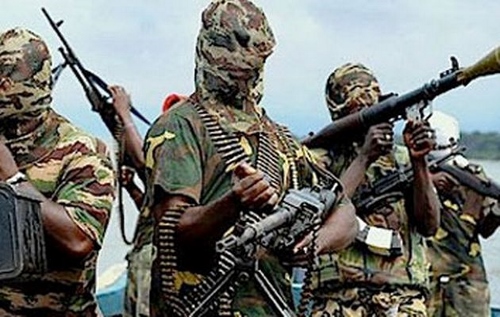
No solution under capitalism
Examined against this background, the responses of so-called opposition political parties in Nigeria and the labour movement are appalling. The Boko Haram menace can actually worsen given the lack of clear and effective alternatives either from the bourgeois opposition or the labour movement. For instance, after a second bomb blast in Nyanya, the Nigeria Labour Congress (NLC – main trade union federation) only released a bland statement reeking in fatalism – “We shall overcome” – that appealed to the government to provide more security. As we go to press, the NLC has not rejected the imperialist military intervention but, as it has done in the past, endorsed an increasing military expedition in the northeast of Nigeria.
Understandably many people hope that a military intervention will see the safe rescue of the Chibok schoolgirls and an end to the violence. But increased militarisation will not solve the problem. Neither will the intervention of ‘experts’ and troops from Western imperialist countries.
In the first instance, despite the state of emergency declared in three states in the north east and the billions of Naira already spent on procuring military hardware, training, deployments etc, the Boko Haram insurgency has only become stronger. Not only has the sect’s attacks and killings continued largely unabated, Boko Haram has also been able to carry out some attacks outside of its territory in the northeast.
This is because military action without the active support of the people is, on its own, incapable of rooting out an insurgency of this character. Due to the brutality and atrocities of the Nigerian army in the northeastern states, the government cannot hope to rely on the sympathy of the people to provide the information required to locate and engage Boko Haram. In March, Amnesty International claimed that six hundred mostly unarmed detainees were extra judicially executed by the army in a single day. And even in situations where people have alerted the security forces of raids by Boko Haram, they have been alarmed at the ineffectiveness of the military.
So far, all that militarisation has achieved is the strengthening of the repressive capabilities of the State against the democratic rights of the working masses. Under the guise of fighting terrorism, the federal government now routinely bans protests and breaks up any “unauthorized gathering”. Encouraging further militarization, as the labour bureaucrats are doing, will have terrible consequences for the working masses.
Imperialist intervention
The US, UK, France and other imperialist capitalist countries are also responsible for the growth and spread of Islamic fundamentalist terrorism across the world. This is as a result of brutal wars orchestrated in order to control the oil and mineral reserves of countries in the Middle East and for other imperialist geo-strategic motives. The US ‘war on terror’ created an inevitable backlash with the spread of Islamic fundamentalism and splinters of Al Qaeda beyond the Middle East into Africa.
The interventions by western imperialist countries in Iraq, Afghanistan, Somalia and Libya have hugely compounded domestic problems. None of the countries mentioned above have regained stability since imperialist troops intervened ostensibly to maintain ‘law and order’. The imperialist countries are ultimately only out to protect their own economic interests. As a columnist with the Guardian (London) aptly put it the “Western intervention will turn Nigeria into an African Afghanistan”.
The only assistance that the working people of Nigeria should accept in the fight against Boko Haram’s insurgency is the international solidarity of the working class of other countries.
Those who hope for a military solution and outside powers’ intervention fail to understand that even if somehow the Boko Haram insurgency subsides, or is driven underground or crushed, so long as the terrible condition of mass misery and desperation caused by capitalism continue, more deadly forms of religious or tribal insurgency and barbarism will arise.
For a socialist solution
The only effective strategy that the labour movement can offer is to begin to mobilize the workers and the oppressed masses to take their destinies into their own hands. There is no army or terrorist group more powerful than the working masses organised and mobilised. To start with, a one-day general strike and mass protest called by the labour movement can send the message to both the corrupt capitalist ruling elite and Boko Haram that the organized working people are prepared to defend themselves against the onslaughts of both.
Through a general strike and mass protest, the labour movement will be able to demonstrate that it is capable of fighting poverty, joblessness and homelessness, which may have pushed some youth into the ranks of Boko Haram and other reactionary forces. This is crucial to begin to undermine the support base of the Boko Haram sect and other such forces. The organized working class can cut across terroristic organisations as well as challenge the interests of the ruling elites. During the January 2012 general strike and mass protests against the removal of the so-called fuel subsidy and hike in fuel prices, not a single bomb exploded in Nigeria.
In the northeastern states threatened by Boko Haram raids, the labour movement has to take the lead in mobilizing workers, masses and the youth to begin to take on the responsibility of securing their neighborhoods and communities. This can only be possible by setting up democratic, multi-tribal and multi-religious self-defence committees. These committees, subject to the control of the entire community, would be responsible for patrolling, gathering information, defence and cooperation with security agencies, which themselves must be placed under democratic control. But for such steps to have a lasting effect they would need to be linked to the building of a united campaign of working people, the poor and youth across Nigeria, that would struggle to end the economic and social crises bred by capitalism. Only this could begin to undermine whatever popular support Boko Haram has and also prevent working people fighting amongst themselves over resources like land or water.
Unfortunately the present Labour leaders are not prepared to take this course of action because they have no vision of a better society beyond capitalism. Many of them are currently looking towards supporting Jonathan’s re-election next year, as the leaders of the mis-named ‘Labour Party’ will do. These bureaucrats, happily enjoying a privileged lifestyle, refrain in trepidation from taking any step which can undermine the current corrupt ruling elite and threaten a revolutionary situation.
The Democratic Socialist Movement (DSM has consistently called for a mass working class political party on a socialist programme. As a step towards this, we have begun the process of seeking the registration of ‘Socialist Party of Nigeria’ (SPN), to allow the Nigerian working masses and youth a platform to organize around. We believe that only a new government formed by the working class and armed with socialist policies can restructure Nigeria and ensure that the huge wealth of the country is used to better the lot of the majority.

